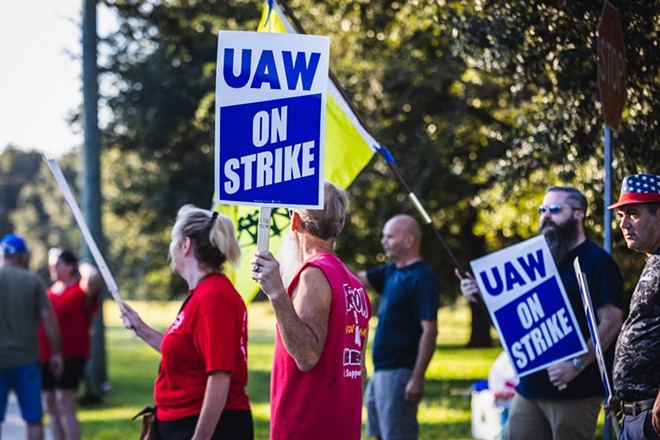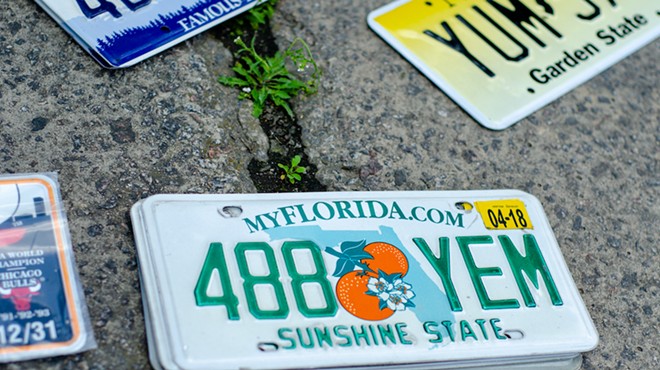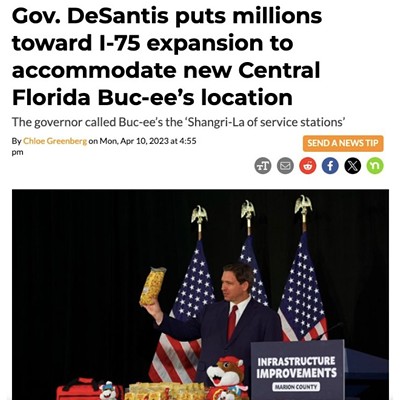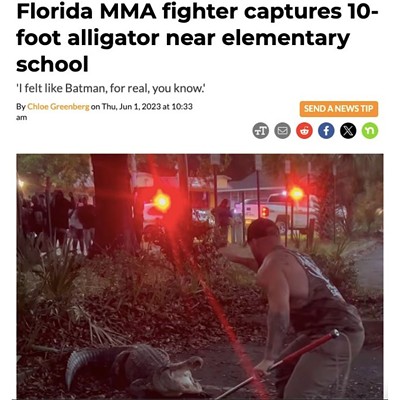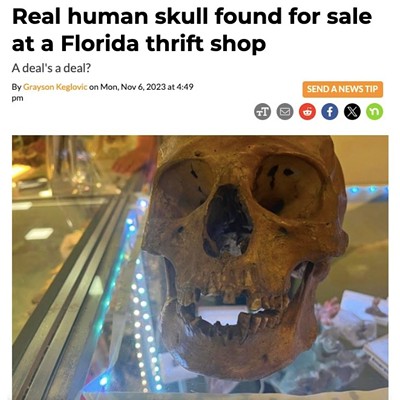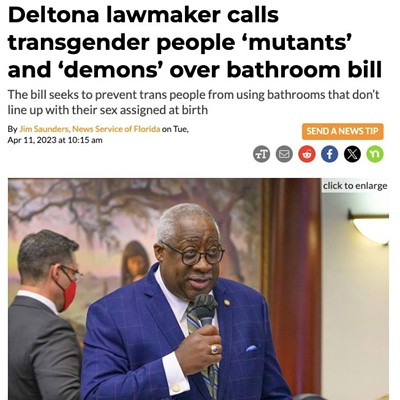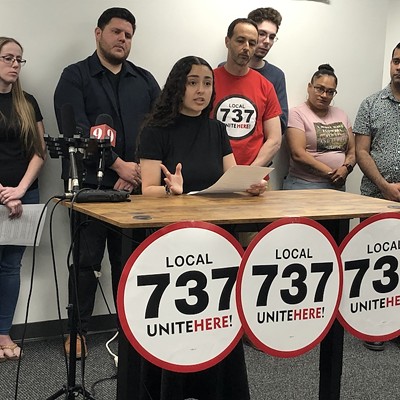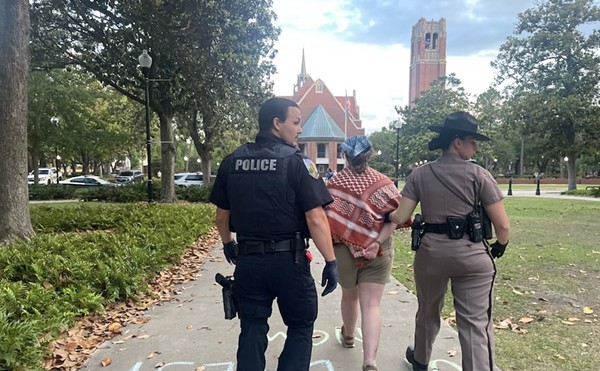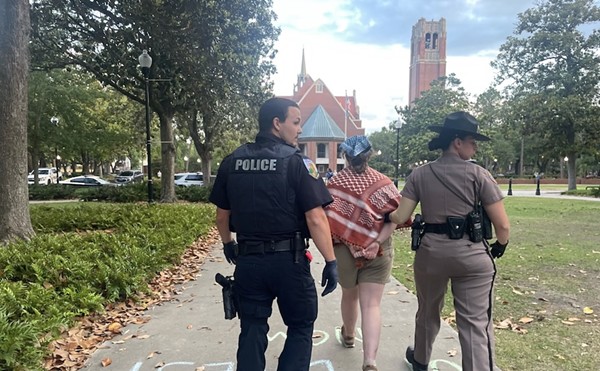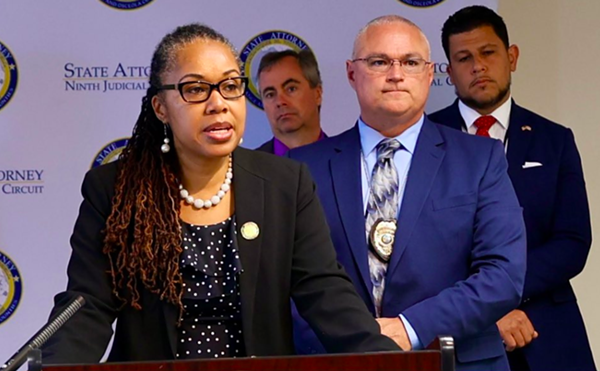Here’s a rundown of our top stories about workers’ rights in Central Florida in 2023.
United Auto Workers in Orlando strike for over a month in fight for better contract
Nearly 50,000 employees of General Motors, Stellantis (formerly Chrysler) and Ford walked out on strike this fall, following the expiration of their union contract. While much of the attention was based on the thousands of workers that walked out on strike in the Midwest — where most of the auto companies’ manufacturing plants are based — there were also about 80 workers at a Stellantis auto parts center in Orlando that walked off the job in solidarity with their co-workers. Orlando Weekly visited the picket line multiple times over the course of the five weeks that they were out on strike to learn more about the effort.
UPS workers in Orlando prepared for a major strike, too
For a full year, hundreds of thousands of UPS drivers and warehouse workers organized with the Teamsters prepared for a historic strike against UPS. They were ready to walk out if the mail delivery titan didn’t meet workers’ demands on pay and workplace issues, such as lack of air conditioning in delivery trucks. Historically, the union has accepted major concessions. But under new leadership, and thanks to years of rank-and-file organizing through the Teamsters for a Democratic Union caucus, the union was now prepared to fight for a deal that would deliver (no pun intended) significant, material gains for members. Orlando Weekly caught up with UPS workers in Orlando preparing for a strike outside of a UPS warehouse in July, where employees said they didn’t want to strike, but were prepared to if it meant fighting for a deal that would offer more than crumbs. UPS stalled, but after executives realized their 340,000 union employees nationwide were serious about their strike threat, they reached an agreement with the union, delivering major gains in a new contract, ahead of the strike deadline.
After the Teamsters won big at UPS, local water delivery drivers made a bid to join the union
Shortly after UPS workers won big with the Teamsters, local beverage delivery drivers for ReadyRefresh, a bottled water supplier owned by a former Nestlé subsidiary, reached out to the Teamsters about organizing a union. In November, the union narrowly lost the union election in a split 10-10 vote by the workers, based in Davenport. More than 50% of support is needed for a union to prevail. Citing certain union-busting allegations, however, the union has called on the federal board that oversees elections to agree to a new election. The outcome of that is TBD.
Dining service workers at Rollins College first began organizing with Unite Here Local 362 in 2022. But they did so quietly, knowing employers can get into aggressive “union buster” mode once workers announce intent to unionize. And that’s exactly what happened. Sodexo, a French company with a long history of union-busting at other sites they cater, waged an aggressive counter-organizing campaign at Rollins College, which took a hands-off approach when asked about their thoughts on the union effort. Sodexo management (allegedly) organized an anti-union rally where supervisors told workers lies about unions. The company also (allegedly) broke federal labor law in a number of other ways (e.g., threatening to fire workers who voted in favor of unionizing). Workers voted 33-39 against unionizing in November. But, because of all of the union-busting behavior, the union has filed a complaint with the federal labor board calling on them to scrap the results.
Immigrant workers, businesses joined statewide protest over Florida’s harsh new immigration law
Gov. DeSantis signed into law one of the harshest anti-immigrant laws in the country this year, after it got the backing of Florida’s Republican-controlled Legislature. The law specifically targets undocumented workers — and the employers who hire them. Business owners warned it could create a labor shortage, particularly in industries such as agriculture and construction. Ahead of the law’s effective date, however, immigrant rights groups and immigrant workers themselves raised hell over it, staging rallies and a statewide day of action on June 1. Orlando Weekly reported on one of those demonstrations, staged outside the office of Rep. Carolina Amesty, an Orlando-area Republican of Venezuelan heritage who campaigned on targeting socialism and “illegal immigration.” She voted in favor of the legislation. Hundreds of immigrant workers and community allies gathered for the occasion, with massive semi-trucks displaying signs bearing phrases such as “We Were Making Fla. Great."
Disney workers approved a new contract delivering an $18 minimum wage and paid family leave
Thousands of union workers at Disney World — character performers, food service workers, custodial and costuming workers — approved a new, five-year collective bargaining agreement that delivered an $18 minimum wage (up from $15) and eight weeks of paid family leave (a first). This came after months of contract negotiations between the Walt Disney Co. and the six labor unions representing workers at Disney, collectively known as the Service Trades Council Union. Disney began with paltry deals offering, for instance, a $1 raise for workers in the first year, which workers overwhelmingly shot down. No deal is perfect. But this was one workers fought for — together. For some of the workers who help make Disney magical for families, it means the difference between being forced to work extra hours just to afford rent, or getting to see your kid perform in their high school band.
Costuming workers at Disney fight to end gender wage gaps
As the Disney World unions gathered together to bargain for a new contract for the theme parks’ 43,000 union workers this year, a small group of those workers who do costuming work told Orlando Weekly about something that’s chronically fallen under the radar: a gender wage gap between costuming workers (most, but not all, of whom are women) and stage tech workers (who are mostly men). Both job classifications are covered by the International Alliance of Theatrical Stage Employees, and stage techs are united in the costuming workers’ call for equity in their wage scale. The Walt Disney Co., however, refuses to even acknowledge this wage gap, and unfortunately, it wasn’t fully addressed in the contract that was eventually negotiated for Disney World workers in 2023. “We’re not birds and mice, playing and singing,” costuming worker Robyn Morie told us. “We’re working hard, and we’re professionals. We just want to be treated like it.”
Entertainment industry workers rallied in Orlando during SAG-AFTRA actors’ strike
Nearly one month into a national actors’ strike, Florida performers represented by the Screen Actors Guild — American Federation of Television and Radio Artists (SAG-AFTRA) rallied at Lake Eola Park in August, in solidarity with union members nationwide striking for fair compensation, job protections and improved working conditions. Performers called on the Alliance of Motion Picture and Television Producers — made up of 350 companies, including employers like Disney, Netflix and Amazon — for a fair contract that would offer better pay to keep up with inflation, protection of their images and performances with the advent of artificial intelligence, better scheduling practices, and reimbursement for relocation expenses when employed away from home. After 118 days on strike, the union reached a deal with the film and TV studios in November, later ratified with 78% of support from union members.
Healthcare workers at HCA hospitals rallied for safe staffing in Kissimmee and Sanford
Nurses at HCA Lake Monroe hospital in Sanford rallied this year over concerns of understaffing in the hospital — a chronic concern that apparently goes chronically unaddressed by HCA, a private corporation. Registered nurses at the Sanford hospital, represented by National Nurses United, have a contract that’s set to expire next year, and they’re looking for HCA to agree to changes in their next one that would help alleviate short-staffing and other issues they experience that they say threatens the level of care they’re able to provide for patients. This creates a safety for patients, they say, but it also causes burnout among nurses. “Some nurses say they fear for their license,” one nurse told us. “I fear for a patient’s life.”
Uber and Lyft drivers in Florida launch effort to organize for better pay and app policies
Uber and Lyft drivers across Florida this year announced a new organizing campaign with the Independent Drivers Guild, affiliated with the Machinists union. Drivers in Central Florida rallied in April, sharing demands for better app policies and profit-sharing (since drivers are increasingly seeing less money from the gig, despite hiked-up costs for passengers). Many of the drivers who rallied gave speeches in Spanish, but the cohort was diverse: a group of Brazilian, Colombian, Venezuelan, Chilean, Dominican, Haitian and U.S.-born drivers, all asking to be afforded a living wage for honest work. “If you’re an independent contractor, you’re not alone,” said Arifa Tirmizi, an Uber driver and mother of seven who began organizing with IDG up in New York.
Starbucks workers in Oviedo continue fight for a first contract after unionizing in 2022
Starbucks workers in Oviedo first voted to unionize with Starbucks Workers United in 2022. Since then, they — and their union co-workers at more than 350 other Starbucks locations — have been fighting for a first contract. Starbucks has stalled on contract negotiations, counseled by their expensive, anti-union legal team. Baristas and shift supervisors in Oviedo, many of whom are students or work multiple jobs, staged a number of rallies this year in an effort to continue uplifting their demands for improvements in the workplace: better scheduling practices, wages that keep up with the cost of living and better healthcare benefits, among other things.
A custodial worker at Universal Orlando filed a complaint against Universal over anti-union policies — and won
Christopher Collins, a custodial worker at Universal Orlando, filed an unfair labor practice complaint with the federal government, accusing Universal of maintaining company policies that violated workers’ rights under federal law. Although it took over a year, Collins won. Two days ahead of a scheduled trial, Universal reached a settlement agreement, agreeing to scrap or “lawfully revise” certain company policies (e.g., a policy that prohibited workers from wearing pro-union pins) to ensure compliance with federal labor law. Collins didn’t have a fancy legal team on his side. “I didn’t have anyone helping me or giving me advice,” he told Orlando Weekly in August, when the federal labor board moved forward with his case. “I just did it.”
DeSantis signed into law an unpopular anti-union bill
Florida Gov. Ron DeSantis signed into law a bill (SB 256) designed to undermine most public sector unions across the state, under the guise of “paycheck protection.” Unions representing cops, firefighters and correctional officers — which generally endorse Republicans for office — were exempted. The bill, over a decade in the making, makes it harder for unions to collect dues from members by banning paycheck deductions (during public testimony on the bill, union members decried this as overreach, arguing that it’s easier to pay dues this way). The new law also requires at least 60% of union-eligible employees to be dues-paying union members in order for the union to remain certified and able to bargain for better wages and workplace improvements. Under Florida’s right-to-work law, you don’t have to be a dues-paying member of a union to reap the benefits if your workplace is covered by one. The bill was backed by business lobbying groups and conservative think tanks, including one that’s behind a new effort to deregulate child labor in Florida.
Top union buster in Orlando is a repeat violator of federal labor law
The Labor Pros, headquartered in downtown Orlando, is one of the most active “union avoidance” consulting firms in the country. It’s also one of the top violators of a federal law that requires “union avoidance” consultants (aka union busters) to file financial disclosure reports with the U.S. Department of Labor. That law requires disclosure reports, detailing the union-busting work they do for employers, to be filed within 30 days of entering into an agreement with the employer. But the Labor Pros has a history of filing their reports late or incorrectly — with reports missing information or misspelling labor consultants’ names, which makes them harder to track in federal databases. Consultants for the firm, according to filings with the DOL, have worked for the likes of companies like Hilton Hotels, Guitar Center, and Barnes & Noble College Bookstores, where one of their union busters allegedly told a worker that being part of a union was akin to “chattel slavery.” Undeterred, workers there voted overwhelmingly in favor of unionizing anyway.
Florida’s minimum wage went up — but there’s a problem: Enforcement is weak
Florida voters in 2020 overwhelmingly voted in favor of raising Florida’s minimum wage gradually from $8.46 to $15 by October 2026. The initiative got the support of nearly 61% of voters — more votes than either former president Donald Trump (who won the popular vote in Florida in 2020) or President Joe Biden. Currently, the minimum wage is $12 an hour. But, because of a lack of enforcement in the state, labor advocates warn the state needs to do more to actually make sure bosses are following the law. Florida lawmakers dissolved the agency tasked with enforcing minimum wage in 2002 — and didn’t give that task to anyone else until 2005. Since then, the State Attorney General (currently, Republican Ashley Moody) has been the only state enforcement official for making sure bosses pay workers what they’re legally owed in wages, tips and overtime. Records show, however, that the AG rarely actually goes after wage theft.
Florida Republican wants older teens to be able to work dangerous jobs and longer hours
Florida Republicans have filed two separate bills (HB 49 and SB 460) that would roll back certain child labor protections for minors under state law. Child labor abuses and violations in Florida (and across the country) are on the rise, so suffice it to say, they’re not exactly reading the room.
Senate Bill 460, filed by Sen. Corey Simon (the former NFL football player), would allow 16- and 17-year-olds to work jobs in roofing and construction that are currently deemed too dangerous for minors. House Bill 49, filed by Rep. Linda Chaney, would gut child labor protections that prevent bosses from putting16- and 17-year-old teens to work after 11 p.m. on school nights. It would also allow employers to work those older teens (or, “youth workers,” as Chaney calls them) for more than 30 hours during a school week.
House Bill 49 is backed by the Florida Restaurant & Lodging Association, a deep-pocketed front group for restaurants (e.g. McDonald’s, a repeat violator of child labor law) and hospitality employers, including Disney. The bill was literally written by the Foundation for Government Accountability, a conservative think tank funded by billionaires that lobbies for policies that make low-income families’ lives harder. Records obtained by Orlando Weekly show that Simon’s bill, expanding the labor pool of child roofers, was written by the Florida Home Builders Association and Associated Builders and Contractors.
Subscribe to Orlando Weekly newsletters.
Follow us: Apple News | Google News | NewsBreak | Reddit | Instagram | Facebook | Twitter | Or sign up for our RSS Feed

